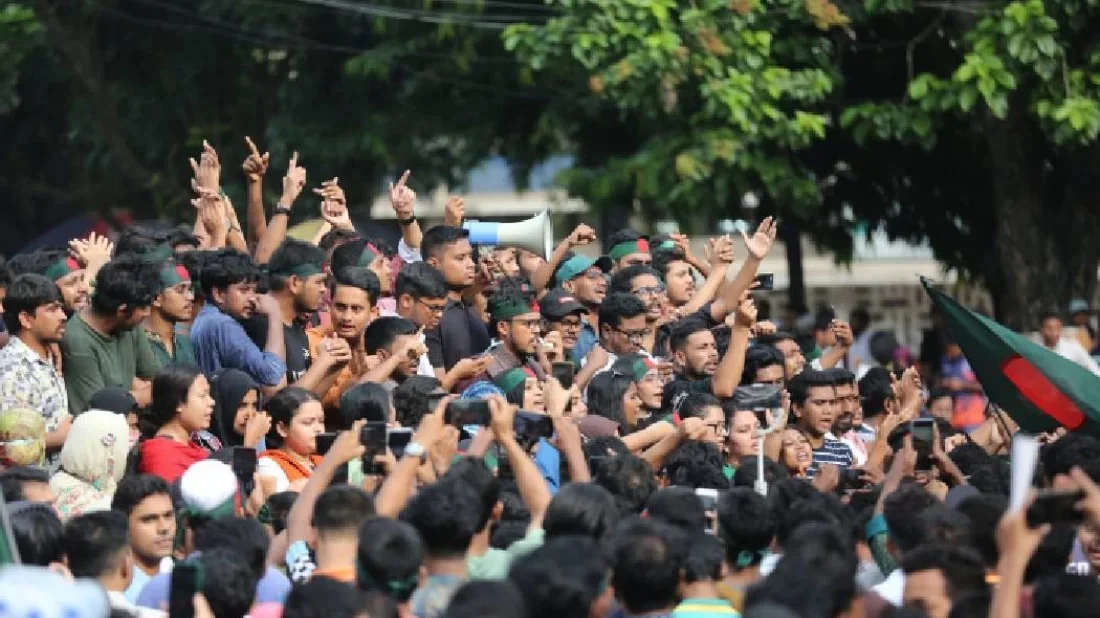Student protesters aim to form a new political party to strenthen revolution
Share on:

Student demonstrators who ousted former prime minister Sheikh Hasina have turned down appeals from Bangladesh's two major political parties for swift elections.
PauseMuteLoaded: 64.65%Remaining Time -5:03Close Player
Instead, they are anticipating the formation of their political party to solidify the reforms, according to interviews with four protest leaders.
Their goal is to prevent a repeat of the past 15 years, during which Hasina governed the 170 million-strong nation with an iron fist, reports Reuters.
This situation began to change in June when a small group of students, mostly in their early to mid-20s, started organizing protests against a law that reserved coveted government jobs for specific segments of the population.
Within weeks, Hasina's government was overthrown by a surge of popular outrage over its brutal crackdown on anti-quota protesters.
The violence resulted in around 600 deaths, marking the largest episode of violence since Bangladesh's independence from Pakistan in 1971.
The movement was celebrated as a Gen Z revolution, driven by young Bangladeshis' frustration with years of stagnant job growth, accusations of corruption, and diminishing civil liberties.
An interim government led by Nobel Peace laureate Muhammad Yunus, which includes two student leaders in key roles, is now governing the country.
For most of the past 30 years, Bangladesh has been ruled by either Hasina's Awami League or the BNP led by her rival Khaleda Zia, both of whom are in their 70s.
Student leaders are contemplating the creation of a new political party to break this duopoly, according to Mahfuj Alam, who chairs a committee responsible for coordinating between the government and social groups like teachers and activists.
The 26-year-old law student told Reuters that a decision would be made in about a month.
Protest leaders wanted to consult widely with citizens before deciding on a platform, he added.
Details of the students' plans for their movement's political future have not previously been reported.
"People are tired of the two political parties. They have trust in us," he said, at the gates of Dhaka University's Arts Faculty.
Tahmid Chowdhury, another student coordinator who played a key role in ousting Hasina, indicated there was a "high chance" they would establish a political party. They are still finalizing their platform, but Chowdhury noted it would be based on principles of secularism and free speech.
Meanwhile, the student leaders in the interim government have not yet detailed their specific policy plans, other than advocating for broad institutional changes.
These changes include reforming the electoral commission, which was appointed by Hasina, to prevent a return to authoritarian rule.
The essence of the movement was to build a new Bangladesh where no fascist or autocrat can return, said Nahid Islam, 26, a leading protest organizer who is now in Yunus' cabinet.
“To achieve that, we need structural reforms, which will undoubtedly require some time.”
Nahid further stated that the government is not heeding calls from the Awami League and BNP to hold new elections as early as the fall.
Foreign Adviser Md Touhid Hossain said that the students had not yet discussed their political plans with the technocrats.
However, he noted: “The political landscape is bound to change because we have essentially excluded the younger generation from politics.”
“We are completely in uncharted territory, both legally and politically,” said Shahdeen Malik, a constitutional expert.
“The powers of this interim government are unclear because there is no constitutional provision for it.”
Reuters interviewed over 30 individuals, including key student leaders, Sajeeb Wazed (Hasina's son and adviser), opposition politicians, and army officers, to evaluate the divisions remaining after the protests and the prospects for the new government.
Hasina, who is hoping to return to Bangladesh according to her son, was unavailable for comment.
“The political parties are not going anywhere. You cannot eliminate us,” Wazed said from the United States, where he resides.
“Sooner or later, either the Awami League or the BNP will return to power. Without our assistance and our supporters, achieving stability in Bangladesh will be impossible.”
The surge in violence that week spread the demonstrations from public campuses to private institutions, according to Nayeem Abedin, a 22-year-old coordinator at East-West University.
“We felt a responsibility to join the protests for our fellow students,” he said.
"It felt like a turning point," said Nahid Islam. "Private university students joined in, and unexpectedly, so did many parents."
“I also told my mother, ‘No, we need to immediately instruct the Chhatra League to stop the attacks and end the violence,’” Wazed said, though he did not provide additional details.
“We also suspended the police officers who fired on students.”
At least two officers were suspended in early August after a video depicting the killing of a student went viral online. The student leaders plan to prosecute police and paramilitary accused of abuse.
On July 21, Supreme Court, whose judges were effectively appointed by Hasina, ruled that 93% of state jobs should be open to competition, meeting a key demand of the students.
The demonstrations continued to grow.
Sheikh Hasina declared an indefinite curfew on August 4, a day after at least 91 people were killed. The army told the prime minister that evening it would not enforce the lockdown.
"The army chief didn't want more bloodshed," said one serving officer, who spoke on condition of anonymity because he wasn't authorized to talk to media.
"People from all walks of life were joining."
The next day, as crowds marched to her official residence, Hasina fled to India.

